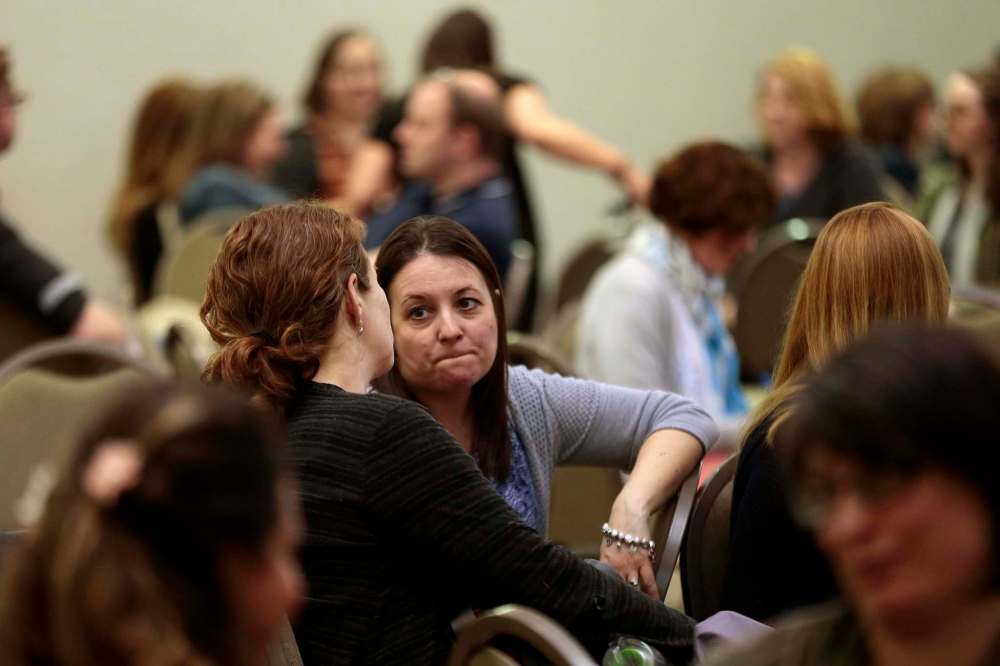300 Manitobans voice concerns about education review
Advertisement
Read this article for free:
or
Already have an account? Log in here »
To continue reading, please subscribe:
Monthly Digital Subscription
$0 for the first 4 weeks*
- Enjoy unlimited reading on winnipegfreepress.com
- Read the E-Edition, our digital replica newspaper
- Access News Break, our award-winning app
- Play interactive puzzles
*No charge for 4 weeks then price increases to the regular rate of $19.00 plus GST every four weeks. Offer available to new and qualified returning subscribers only. Cancel any time.
Monthly Digital Subscription
$4.75/week*
- Enjoy unlimited reading on winnipegfreepress.com
- Read the E-Edition, our digital replica newspaper
- Access News Break, our award-winning app
- Play interactive puzzles
*Billed as $19 plus GST every four weeks. Cancel any time.
To continue reading, please subscribe:
Add Free Press access to your Brandon Sun subscription for only an additional
$1 for the first 4 weeks*
*Your next subscription payment will increase by $1.00 and you will be charged $16.99 plus GST for four weeks. After four weeks, your payment will increase to $23.99 plus GST every four weeks.
Read unlimited articles for free today:
or
Already have an account? Log in here »
Hey there, time traveller!
This article was published 15/05/2019 (2402 days ago), so information in it may no longer be current.
As Manitoba’s K-12 education review commission nears the end of its public meeting schedule, more than 300 educators and parents squeezed into Winnipeg’s Caboto Centre on Wednesday night for a 21/2-hour discussion that some said required more time.
The teachers, principals, educational assistants, school trustees and others listed topics they wanted to discuss when registering online for the 10th of 11 such events, which have been held across Manitoba in April and May.
More than 30 of the registrants’ suggested topics were chosen and placed into break-out sharing circles for discussion.

Their topics included school funding, class sizes, LGBTTQ* education, newcomer services, French immersion and school governance models.
Later in the evening, some of the topics were replaced with other ideas suggested by attendees. Governance was replaced by healthy workplaces in education. Bilingual education was swapped in for amalgamation.
Many of the discussions ultimately circled back to school funding and how the province might develop a more equitable model to distribute money, while keeping some governance control among local school boards.
“I think whatever the model is, it needs to give enough local control… so kids are getting what they need,” said Andrew Volk, a principal in the Seven Oaks School Division.
He said schools with higher poverty levels among their student bodies need more funding for food programs and social work, among other investments.
Education consultant and teacher Sandy Turcotte attended the previous K-12 commission meeting at the Caboto Centre last month, where there was a question-and-answer period with commissioner Clayton Manness.
She questioned why the format of Wednesday’s event didn’t include the same Q-and-A time.
“A sharing circle is lovely, but I think the opportunity to ask questions is vital,” Turcotte said.
In an interview, Manness said the commissioners wanted more time to listen to Manitobans.
“We haven’t even come together as commissioners yet to draw any type of consensus on these issues. We are here as observers and we need time to do that before we can meaningfully answer a lot of these questions,” he said.
Avis Glaze, the lead consultant hired by the commission, was also in the room Wednesday.
Glaze is known for lending her advice to the Nova Scotia government last year, which resulted in sweeping changes to that province’s school systems, including amalgamating English-language school boards into one 15-member advisory council.
The Free Press requested an interview with Glaze, which the education commissioners declined without asking the consultant.
Alan Campbell, president of the Manitoba School Boards Association, said he has attended seven of the 10 public consultations, and the mood in each room has been varied — with shades of anger, frustration, worry, fear, anxiety and passion in every meeting.
“I’ve watched Glaze take copious notes from countless table conversations that she’s been in, as have many of the commissioners,” Campbell said.
“Some of the comments that I’ve heard most clearly from the commissioners is that the feedback they receive from these consultations will inform the outcomes of the review. So, if that is accurate, then we have reason for cautious optimism as we move forward.”
The final public consultation for the K-12 review commission will be held May 25 from 9 to 11:30 a.m. at R.B. Russell Vocational School.
The commission is also accepting written submissions online, and has so far received more than 500, said commissioner Terry Brown.
The commission has collected more than 5,400 online surveys from Manitobans and more than 900 surveys from teachers.
jessica.botelho@freepress.mb.ca
Twitter: @_jessbu


